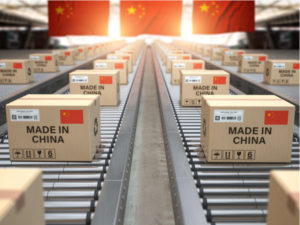Bloomberg reports that 40% of Americans will not buy Chinese made goods and a record 60% now have a negative view of the country. It’s about time the public turned negative on China. Young Research has been pointing out the problems in China for years and advising against investment in the country.
In early 2012, we explained.
It is perplexing that the world has allowed a command style economy run by an unelected political party to become such an important player in the global economy. China is now the world’s second largest economy and America’s second-largest trading partner. If China heads into the tank, the world economy will suffer.
No Profit Motive
China doesn’t play by the same rules or have the same motives as the world’s other large economies. China has consistently manipulated its currency to gain export market share and it has subsidized favored industries through its financial system to the detriment of non-Chinese companies. Take the rare earths industry as an example. China now has an effective monopoly on rare earths production. Not because of the country’s low labor costs or a lack of reserves in other countries, but because Chinese rare earths companies were provided with subsidized loans. Rare earths companies ramped up production in the ’80s and ’90s and drove prices down to unprofitable levels. The Chinese government was more interested in maintaining stability through high employment then, as they are today. Low prices pushed rare earths producers in the U.S., Australia, and elsewhere out of business. With the support of subsidized loans, China’s rare earths companies were the only companies able to remain in business at such low prices. Now the U.S. relies on China (at least temporarily) for a supply of metals vital to the defense industry and other high-technology industries. Sound like a smart strategy to you?
Chinese Hacking
There is also mounting evidence that China has been hacking into the networks of U.S. companies and organizations. The Wall Street Journal reported recently that a group of hackers (read: the Chinese government) hacked into the U.S. Chamber of Commerce’s computer network. The Journal reports that the hackers may have had access to the Chamber’s network for more than a year before the breach was discovered. The full extent of the damage from the hacking incident will be difficult to determine, but it is possible the Chamber’s network was used to send booby-trapped emails to Chamber members (large U.S. companies) to gain access to their computer networks with the likely intention of stealing trade secrets. According to the U.S. counterintelligence chief, the Chinese are “the world’s most active and persistent perpetrators of economic espionage.”
So then, China unfairly manipulates its currency to gain export market share, it subsidizes favored industries driving companies in America and other countries out of business, and it illegally hacks into U.S. company computer networks. Sound like a country that should be our #2 trading partner? How about a country you want to invest in? I continue to avoid Chinese shares and advise the same for you.
Bloomberg’s Brendan Murray reports:
It’s not quite a new Cold War yet. Just the cold shoulder.
Some 40% of Americans said they won’t buy products from China, according to a survey of 1,012 adults conducted May 12-14 by Washington-based FTI Consulting, a business advisory firm.
That compares with 22% who say they won’t buy from India, 17% who refuse to purchase from Mexico and 12% who boycott goods from Europe.
The poll also found:
- 55% don’t think China can be trusted to follow through on its trade-deal commitments signed in January to buy more U.S. products
- 78% percent said they’d be willing to pay more for products if the company that made them moved manufacturing out of China
- 66% said they favor raising import restrictions over the pursuit of free-trade deals as a better way to boost the U.S. economy
For observers of trade policy, that last point is striking because a large majority in the U.S. have traditionally shunned protectionism. According to Gallup, almost four-fifths of Americans embrace international commerce as an opportunity rather that a threat, a number that’s steadily risen over the past decade.
Read more here.

